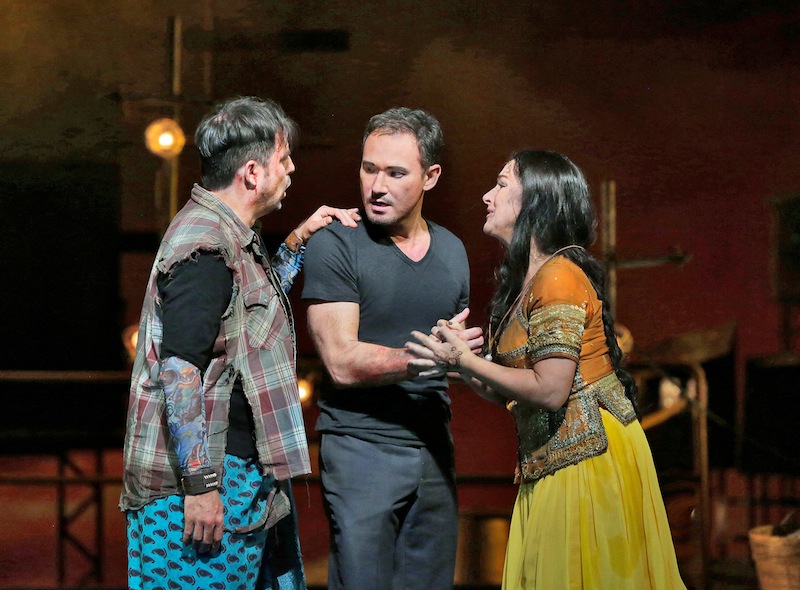Kwiecien, striking production provide inspired advocacy for Met’s “Pearl Fishers”

Matthew Polenzani, Mariusz Kwiecien, and Diana Damrau in Bizet’s “The Pearl Fishers” at the Metropolitan Opera. Photo: Ken Howard
Bizet’s The Pearl Fishers is in no way a great opera. An early work from the composer, the score is caught in limbo at some unresolved point between bel canto and romanticism. There are a number of truly fine, substantial passages that are musically inventive and dramatically expressive, but there is also a lot of predictable phrases, rhythms, and modulations that conform to mid-19th century received wisdom about how opera was supposed to be written.
The score is the single most important element of an opera, but an opera production is much more than the score. And so the Metropolitan Opera’s new production of The Pearl Fishers, which opened New Year’s Eve, is a real success, one that is a pleasure in its own right and that flatters Bizet with generous attention and affection. Thursday night was only the company’s fifth performance of the work, but judging by the quality of the staging, the reaction of the audience, and the delighted “Whoop!” that came from behind the final curtain, this show looks to be a staple of the Met for years to come.
The story is a classic love triangle—two men vying for one woman—originally set in a village of pearl divers in ancient Ceylon. The woman, Leila (soprano Diana Damrau), is an old flame of village leader Zurga (baritone Mariusz Kwiecien) and pearl diver Nadir (tenor Matthew Polenzani). Leila arrives in the village veiled to take the position of priestess, and so neither man initially recognizes her.
The main drama is an operatic cliché, but the production from director Penny Woolcock (with stage design and realization by Dick Bird—in his Met debut—and 59 Productions) goes a long way toward embellishing that. The production is threaded with representations of roiling waves and churning clouds, and opens with an enthralling vision. During the overture a projection of sunlight seen from deep underwater comes up on a scrim, and then behind it aerialists “dive” down to the bottom and swing back up in an arresting visual.
Woolcock and Bird also replace the offhand orientalism of the original with a more realized image of a recognizable society. The villagers are still diving for pearls, but in the modern era: the community docks float on fifty-five gallon drums; Zurga campaigns for the post of village elder by handing out campaign flyers in the shape of a mask of his face; and much of Act III takes place in a book-lined office, complete with TV and mini-fridge.
Bizet’s music rocks back and forth between dutiful and inspired, often in the space of a few bars. The recitative between Zurga and Nadir before their well-known duet “Au fond du temple saint” is dull and effortful, but the duet itself is an inspired and heartfelt expression of what the characters are thinking and feeling. Kwiecien and Polenzani sang it with great tenderness, but the moment is undercut by the music that follows, the odd dancehall waltz “Amitié sainte.”
The libretto by Eugène Cormon and Michel Carré doesn’t help: Leila and Nadir have hardly anything to do but sing about their fervid love for each other; they are attractive but uninteresting. Zurga is the only fully realized character. He is conflicted and mercurial, the source of the opera’s drama, and Kwiecien’s superb portrayal is the core of this production’s success. He revealed an ongoing series of facets to the character, modulating the quality of his voice so that each would have the ideal fit. The staging takes the unnerving connection between male obsession with female sexual purity and arson—in the original—and adds Zurga’s struggling between village traditions and modern mores.
In Act II, Leila sings “Me voilà seule dans la nuit,” and behind her more divers appear, swimming through the air. It is spectacular, beautiful, and gives Leila an added dimension—she sings about the lurking presence of Nadir, but the production gives this the double purpose of a prayer that keeps the pearl fishers safe. Damrau’s sound was full of weight and emotion, making this one of the high points of the evening.
Both she and Polenzani sang with musicality and feeling. Their individual arias and the duet “Ton coeur” are some of the best parts of the score, and they clearly relished the chance to speak through the music. Polenzani’s light, lyrical tenor is ideally cast in this part—he gives Nadir the dimension of a young man’s naïve obsession.
Kwiecien did even more. The production introduces him as a small time politician, with a touch of the petty autocrat, and his singing was at first smooth, ingratiating, with a calculated sincerity in “Au fond.” But when the character explodes with the turmoil of jealously, love, and honor, Kwiecien did so as well, with a surge of charismatic singing.
The sequence that opens Act III has Zurga wrestling almost maniacally with feelings of tenderness, betrayal, love, jealously, confusion, and certainty—all this both solo and in duet with Leila. Kwiecien’s singing and acting in this stretch was a tour-de-force of opera performance, and at that moment in this production, one was almost convinced that Pearl Fishers is a great opera.
Bass-baritone Nicolas Testé delivered a solid portrayal of the officious hight priest Nourabad. The Met Opera chorus sang with a commitment to the idea that all the music was worthwhile, and that was matched by the fine playing of the orchestra, under conductor Gianandrea Noseda’s secure and smooth pacing.
The Pearl Fishers runs through February 4. metopera.org


Posted Jan 01, 2016 at 2:14 pm by Leslie
I wondered what the reviewers would say.
I went to the opera because Matthew was in it and because the music is wonderful, but I agree with your review, George. I really do.
I do think the ocean videos in the scene changes, do go on for a little too long. They are wonderful, but stall the momentum.
I know it’s about the “music,” But in opera, it’s about the ‘theater.” This is incredibly well-staged and performed, so I was a little disappointed, when I felt like we had “wait time.”
I’ve always like Mariusz but just like I liked a lot of singers. But since I saw him last, I think he’s risen to a whole different level; his voice has deepened and broadened, with I think more flexibility, and his acting has just been blown out of the park with this performance. I’m pleased to be going to multiple performances of this.
Wasn’t it a wonderful evening?